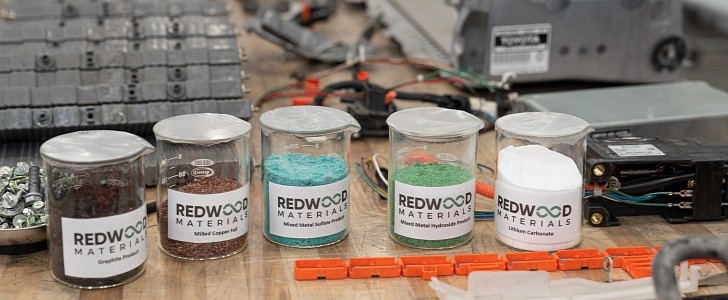JB Straubel is more known as the engineer Elon Musk included in the deal that turned them into Tesla founders even if they joined the company after it was already running. That did not keep Straubel at Tesla. On the contrary: he saw an opportunity in recycling batteries and founded Redwood Materials. After making a deal with Ford in September 2021, the company will also recycle Toyota battery packs.
Both companies talked about the partnership and said that “Toyota paved the way for clean transportation with the introduction of the Toyota Prius hybrid electric vehicle more than 20 years ago.” With Toyota accelerating its electrification plans with more capable plug-in hybrid cars and the bZ4X, it may provide more cells for Redwood Materials to recycle.
Most battery packs currently employed by Toyota are nickel-metal hydride (NiMH). Its plug-in hybrids and the bZ4X use ternary lithium-ion cells, but most of the batteries coming for recycling will be NiMH, which may become a helpful source of nickel.
Redwood Materials currently gets around 6 GWh in end-of-life cells for recycling. By 2025, it intends to get enough of them to deliver anode and cathode materials for 100 GWh in batteries. That would be enough for 1 million EVs with 100-kWh battery packs. By 2030, Straubel’s company plans to deliver anodes and cathodes to make 500 GWh in batteries.
Currently, Redwood Materials is located in Nevada, close to California. In its expansion plans, it said it would probably have a facility close to the Toyota Battery Manufacturing, North Carolina (TBMNC) in Liberty, North Carolina. With an investment of $1.29 billion, this North American battery plant will manufacture enough cells for 12 million electrified vehicles per year. Having a Redwood Materials plant close to this factory will help cut transportation costs and carbon emissions.
For Toyota, the partnership helps it show it is willing to sell electrified vehicles apart from hybrid cars. For Redwood Materials, it gives access to another relevant carmaker, even if it will work with them in a closed-loop solution. In other words, the batteries Ford and Toyota want Redwood Materials to recycle will come back to them as anode and cathode material. It will be interesting to see how Straubel’s company will manage that.
Most battery packs currently employed by Toyota are nickel-metal hydride (NiMH). Its plug-in hybrids and the bZ4X use ternary lithium-ion cells, but most of the batteries coming for recycling will be NiMH, which may become a helpful source of nickel.
Redwood Materials currently gets around 6 GWh in end-of-life cells for recycling. By 2025, it intends to get enough of them to deliver anode and cathode materials for 100 GWh in batteries. That would be enough for 1 million EVs with 100-kWh battery packs. By 2030, Straubel’s company plans to deliver anodes and cathodes to make 500 GWh in batteries.
Currently, Redwood Materials is located in Nevada, close to California. In its expansion plans, it said it would probably have a facility close to the Toyota Battery Manufacturing, North Carolina (TBMNC) in Liberty, North Carolina. With an investment of $1.29 billion, this North American battery plant will manufacture enough cells for 12 million electrified vehicles per year. Having a Redwood Materials plant close to this factory will help cut transportation costs and carbon emissions.
For Toyota, the partnership helps it show it is willing to sell electrified vehicles apart from hybrid cars. For Redwood Materials, it gives access to another relevant carmaker, even if it will work with them in a closed-loop solution. In other words, the batteries Ford and Toyota want Redwood Materials to recycle will come back to them as anode and cathode material. It will be interesting to see how Straubel’s company will manage that.






